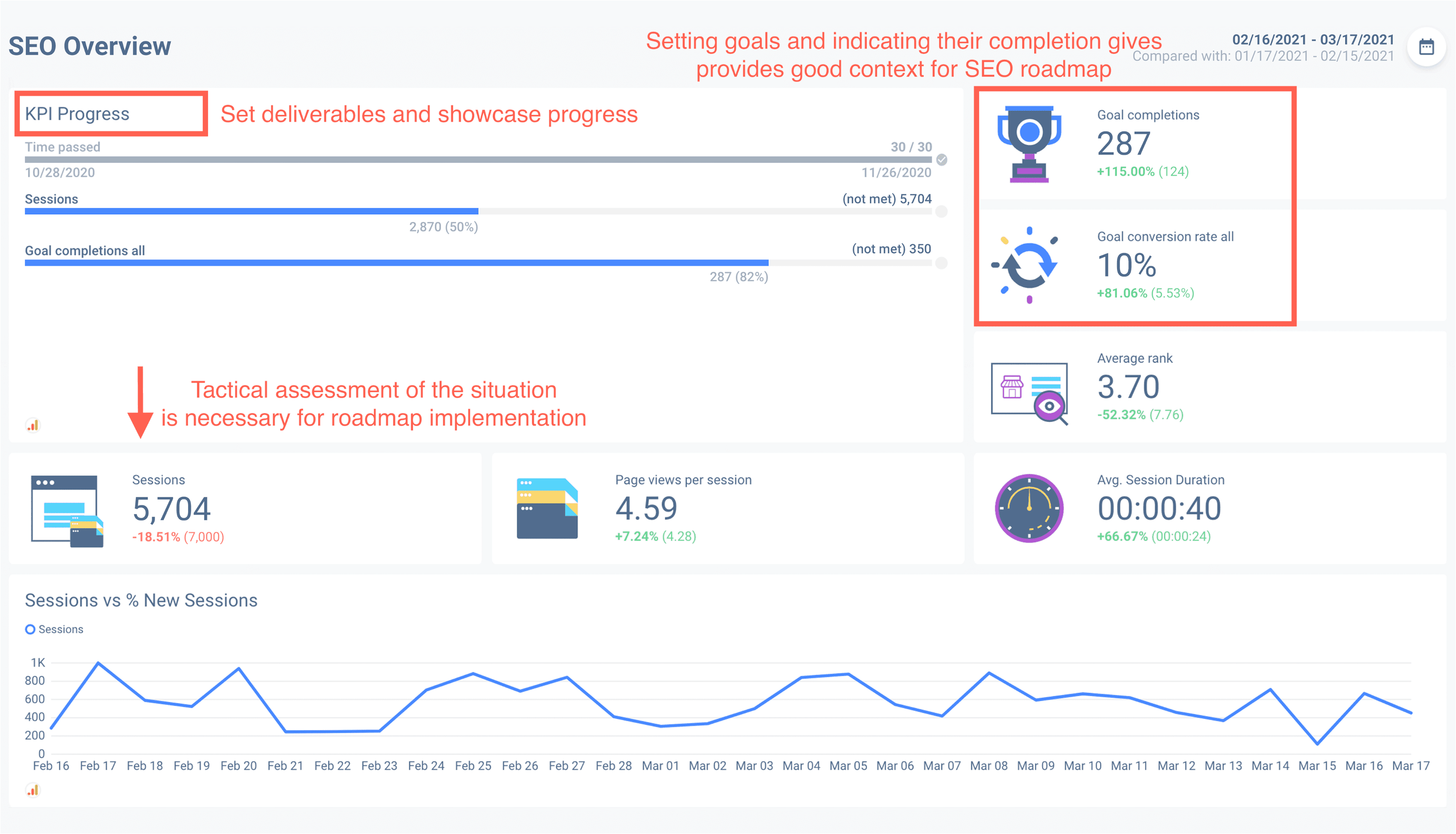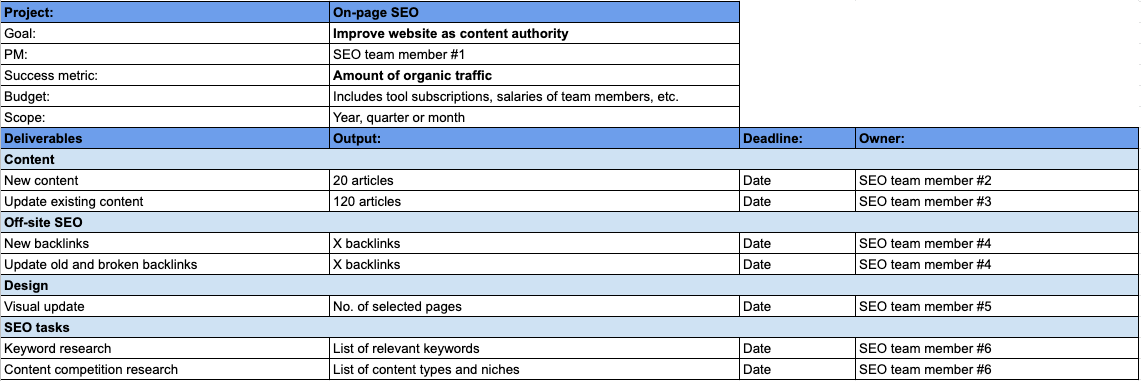How to Create an SEO Roadmap in 2025 [Template Included]
Search engine optimization. Three words have a lot of moving parts behind them. In 2024, SEO strategy ranked No. 3 in providing the most ROI for US marketing professionals. The traditional view on SEO efforts is that it needs minimal development resources and brings good, cheap results. And to some extent, that's true. But good results can only happen with good management, and an SEO roadmap is crucial.

Dec 01 2021●4 min read

What is an SEO roadmap?
Quick definition: an SEO roadmap is a strategic document listing SEO goals, deliverables and ongoing actions.
While not all SEO roadmaps are created the same, there are vital components that make a strong SEO roadmap:
- An overarching goal the SEO strategy has to achieve. This can be ICPs, organic traffic, raising domain authority (based on individual definition) and so on. The critical thing here is: the goal has to be numerical and achievable within a time frame.
- Deliverables. To achieve set goals, the SEO roadmap has to contain a list of deliverables. These can be long-term or quick wins, like fixing title tags, setting internal links, creating relevant content and similar. Deliverables must also have concrete, achievable deadlines.
- Owners and participants. Each deliverable can have one owner that manages other team members towards task completion. For example, suppose the deliverable is to update existing content. In that case, an SEO expert will own the project, selecting a list of articles after an SEO audit for the content team to update. Then the SEO expert will pass the content to be promoted on social media. And so on.
- Categories and deadlines. All deliverables should be categorized into bigger projects, like the update mentioned above of existing content. All these projects and deliverables have to have clear deadlines.
- Outlines. An SEO roadmap must also outline workflows and standard operating procedures. But it must also be flexible enough to change based on unexpected events and needs.
Dashboard example: an SEO dashboard like this will help you visualize your SEO roadmap strategy. Set goals and monitor their progress. Define the deliverables and watch tactical-level changes as your roadmap moves along.

Key questions the SEO roadmap answers
An SEO roadmap is essentially a set of projects based around SEO opportunities. When building it, there are five core questions that all SEO roadmaps should answer:
- What? - What actions are we taking in our SEO strategy?
- Why? - Why are you doing these specific SEO projects? OR what results do we expect they will bring?
- When? - By when these SEO projects should be finished?
- Where? - Which web pages will our SEO strategy focus on?
- Who? - Who are the owners of SEO projects, and who are other team members? Who are they reporting to?
An SEO roadmap template
So an SEO roadmap is a collection of projects aimed at executing overall SEO strategy. Your final document will contain a list of these projects, with clear goals, milestones and deadlines. Here's how an SEO project can look like when set into the SEO roadmap: 
This template outlines details essential for the project. Anyone reading it will understand what this SEO project aims to achieve, who participates in it and what benefits it will bring. This type of template can be reused in any kind of SEO project.
For example, if your SEO team also contains a social media specialist, this type of project can include content promotion on social networks. If your team is running an extensive SEO campaign on a set of target keywords, aiming to raise your website higher on search results - your team may include more content writers or more off-site specialists.
The template is very flexible. Whether you're focusing on technical SEO, link building or other tactics, it's the SEO's job to run these projects. And projects can only be run successfully with good project initiation.
Staying on the same page
Tools and priorities can help your SEO plan reach its full potential. There are some aspects to SEO roadmaps that are instrumental:
- Tackle quick wins. Quick wins are short-term SEO tasks that you and your team can perform for great results. Good examples of quick wins are fixing title tags, establishing ranking factors or selecting a target keyword for every blog post.
- Use various tools. There are free and paid resources that can expedite your SEO plan. Google Search Console and Google Analytics will help with keyword research and results tracking. Paid tools like Ahrefs, SEMrush or Whatagraph will help with target keywords and organic traffic insights. It all depends on your budget (an indicator also present in the SEO project template).
- Learn of your audience. Before any SEO roadmap or content strategy is set, you must know your target audience. It's not just about keyword research. Search intent is also necessary, even more than the search volume. It will help you separate your true target audience with the intent to buy from general organic traffic.
Report example: SEMrush is a great tool to use for keyword position analysis. When powered by Whatagraph, you can merge it with your SEO overview report to get an accurate picture of the state of your SEO and build a roadmap accordingly.

Bonus advice: utilize free stuff SEO tools developers give away. Free trials with templates and examples of an SEO strategy are a great way to get started.
Final advice
Building an SEO roadmap is extensive work. If you're planning your SEO efforts for the whole year, you should give it more time than you think you need. Prepare your keyword research and technical audit, identify content holes and competitor analysis. Identify SEO opportunities and set your SEO strategy. Then document it on your SEO roadmap. Good luck!

WRITTEN BY
Indrė Jankutė-CarmaciuIndrė is a copywriter at Whatagraph with extensive experience in search engine optimization and public relations. She holds a degree in International Relations, while her professional background includes different marketing and advertising niches. She manages to merge marketing strategy and public speaking while educating readers on how to automate their businesses.